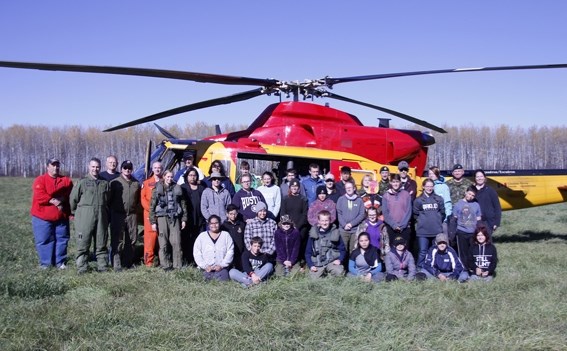It was a weekend filled with bonfires, canoeing, camping and helicopters, as sea and army cadets from Bonnyville, Mallaig and Wainwright participated in two days of training at Camp St. Louis.
“The bulk of the training was geared to get the cadets out on Moose Lake, and experience canoeing, because not a lot of them have,” said Sub-Lieutenant Colin Atkinson, who plays the role of administrative officer for the Bonnyville Royal Canadian Sea Cadets Corps Huron. “It's a leadership and water familiarization, so anytime we get a couple of corps… it allows the cadets to show their leadership, and senior cadets get the ability to prove how to lead, and it gives officers a good idea of what they are able to do, and how we need to help them to progress.”
On Saturday, cadets had the opportunity to canoe on Moose Lake. In the afternoon they participated in an abandon-ship scenario, where some cadets had the chance to face their fear of water and swim to a life raft.
Atkinson said, “It's designed to be a fun weekend, so that's what we geared it for. We wanted to get on the water because some kids are afraid of the water, and that's a really good introductory for them.”
On Sunday afternoon, cadets were told to close their eyes as they made their way to a mysterious location to meet with a very special guest, the 417 Combat Support Squadron.
The 4 Wing Cold Lake squadron's duties include base rescue and national search and rescue.
Prior to the arrival of the helicopter, cadets watched officers build a signal fire, which was used to help flag down search and rescue, and to help aid with notifying the squadron, cadets used their bodies to spell out H-E-L-P.
The scenario was arranged previously by the officers organizing the training camp, and Atkinson said, provided an opportunity for the cadets to see what search and rescue is all about.
“It just gives these cadets that never get that opportunity, the opportunity to see something like that,” he said.
After arriving, the search and rescue (SAR) team went through their standard procedure for responding to a call, using a dummy to show the cadets how they strap injured people into a gurney and hoist them into the helicopter.
SAR technician Master Cpl. Geoff Rowan explained that the process has been described by those injured as terrifying.
This was the first time the camp has ever been hosted in the area, and was a hit among the cadets who attended.
Regimental Sgt.-Major for the weekend Master Warrant Officer Amber Brooker, said she was a fan of canoeing, because, as an army cadet in Mallaig, it is not very often she gets that opportunity.
“Sea cadets got to experience some of the army cadet's side and army cadets got to experience some of the sea cadet's side,” Brooker said.
Brooker continued, adding the cadets experienced teamwork and communication through canoeing and sailing, something they had never done in the past.
“These things are very important for us, so we can extend our knowledge, and get a view of what it can be like to get into these careers… We can help teach others all this. We are not experts in it, but we can give a little insight.”
Brooker has seen search and rescue in the past, however, this experience was different than previous encounters.
“We didn't get to talk to them… this one I think is a very educational one for us.”
After the squadron had completed their scenario, cadets had an opportunity to meet with them in groups and ask them questions about their roles with search and rescue.
Chief Petty Officer with the Bonnyville Royal Canadian Sea Cadet Corps Huron Kaitlin Dery agreed with Brooker. Her favourite part of the weekend was hitting the water in canoes because it was both educational and fun.
Heidi Fisher, petty officer second class with the Wainwright Royal Sea Cadets Corps Cayuga, added it was a great opportunity as her corps rarely participates in camps with others.
“It's just nice to have other corps and have a different perspective on the program,” she said, adding Sunday's search and rescue was the perfect send-off for the weekend.
“It tied everything together. We had the army aspect and the sea aspect, and this is the air force aspect… it was really interesting to see.”



